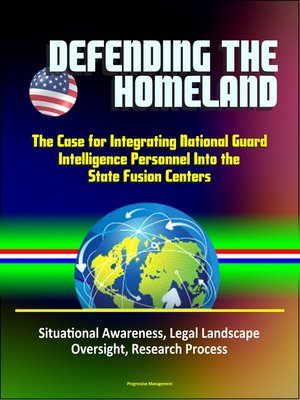Defending the Homeland
ebook ∣ The Case for Integrating National Guard Intelligence Personnel Into the State Fusion Centers--Situational Awareness, Legal Landscape, Oversight, Research Process
By Progressive Management

Sign up to save your library
With an OverDrive account, you can save your favorite libraries for at-a-glance information about availability. Find out more about OverDrive accounts.
Find this title in Libby, the library reading app by OverDrive.



Search for a digital library with this title
Title found at these libraries:
| Library Name | Distance |
|---|---|
| Loading... |
This excellent report has been professionally converted for accurate flowing-text e-book format reproduction. The National Guard lacks a fundamental understanding of the role of intelligence as a result of the historical security paradigm within the United States. This paradigm created a culture so averse to domestic intelligence operations and so deferential to the civil liberties and personal freedoms of Americans that in some instances it imperils them. An oft-asked question since 9/11 is, how many civil liberties are Americans willing to forgo in order to secure their freedoms? For most Americans the obvious answer to that question, as the flurry of post 9/11 legislation and vast changes to America's HLS landscape clearly shows, is 'more than what they currently are Through nearly its entire history, the Guard has been a domestic force with a mission that could best be described as a strategic reserve primarily operating within the borders of the U.S. The longstanding sensitivities of the American public regarding domestic intelligence operations and the Guard's citizen-soldier history, led the Guard, understandably, to minimize its intelligence footprint as much as possible.
Research Process * The Role of the National Guard * The Need for Situational Awareness * The Rise of the State Fusion Centers * The Legal Landscape * Intelligence Oversight Policy * Title 10 vs Title 32, State vs Federal * Current State of Affairs * Two Distinct Worlds: Intelligence and Law Enforcement * A Possible Solution * Impediments to Integration







